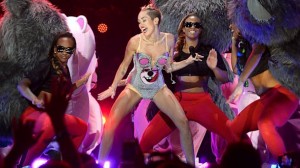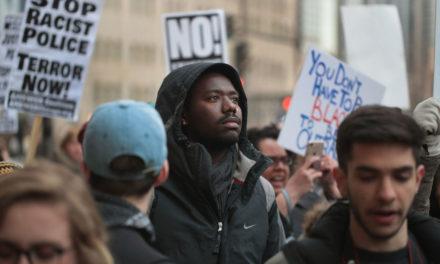by Travis L. Jones
 It has now been several weeks since Miley Cyrus attempted to accomplish at the Video Music Awards’s (VMA) what she said she would: make history. In a post interview she boasted “Me and Robin (Thicke) the whole time said, ‘You know we’re about to make history right now.’” Although her performance did spark more tweets than the Super Bowl (a whopping 300k!), it was nonetheless not that groundbreaking, especially when placed alongside other “cutting edge” performances of the past from the likes of Madonna and Brittany Spears. Sadly, instead of making history, Miley only reaffirmed it.
It has now been several weeks since Miley Cyrus attempted to accomplish at the Video Music Awards’s (VMA) what she said she would: make history. In a post interview she boasted “Me and Robin (Thicke) the whole time said, ‘You know we’re about to make history right now.’” Although her performance did spark more tweets than the Super Bowl (a whopping 300k!), it was nonetheless not that groundbreaking, especially when placed alongside other “cutting edge” performances of the past from the likes of Madonna and Brittany Spears. Sadly, instead of making history, Miley only reaffirmed it.
If you haven’t been keeping up, Miley Cyrus’s recent performance included, among other things, a display of the unfortunate cultural hot topic of “twerking”. Twerking, a style of dance originally made popular by a group of African American women on YouTube, has now made its way into broader streams of culture. Oxford Dictionary just announced that “twerk” will be added to their latest addition and health centers around the country are capitalizing on the fad by offering “twerk classes” as the latest exercise option. (Side note: Thanks to her Zumba instructor, my mom now uses the word “twerk” and as a Gen Yer it is my duty to detest and abandon anything my mother now thinks is cool.) So if twerking is just dance, why all the backlash and conversation that followed this performance?
One of my new favorite sociologists, Tressie McMillan, powerfully summarizes the historical (in)significance of Miley’s twerking performance when she writes:
“Fat non-normative black female bodies are kith and kin with historical caricatures of black women as work sites, production units, subjects of victimless sexual crimes, and embodied deviance…. She is playing a type of black female body as a joke to challenge her audience’s perceptions of herself while leaving their perceptions of black women’s bodies firmly intact. It’s a dance between performing sexual freedom and maintaining a hierarchy of female bodies from which white women benefit materially.”
If you’re like me, you are probably fatigued by the tireless coverage that followed what was simply a 3-minute performance on a routine award show, especially in light of the much weightier global current events like Syria. But as exhausting as the endless coverage seems, and as insignificant as this event was in comparison to other global news, it matters. It matters because popular culture is always a mirror that reflects what’s happening on a much larger scale.
Discussions of Miley’s twerking matter because they point to other ways the gay community is used as a spectacle and prop in society. Conversations about her use of the word “ratchet” and the desire to have something that “feels black” are important because they point to other ways that white privilege is allowed to define, and misrepresent, what is “black” culture. To be fair, I don’t think that Miley, and the dozens that surround her, are on a mission to misrepresent underrepresented groups for the sake of a new dollar (although this is the final outcome). In fact, when she said in an interview “You are thinking about it more than I thought about it when I did it…I didn’t even think about it when I did it because that’s just me”, I believe her. That’s what privilege does; it erases the need to think about the consequences of your actions and how you may be hurting another group of people. And this is exactly why discussions about these things, as tiresome as they can be, are important.
The hope is that popular culture’s examples of privilege, discrimination, racial appropriation, and gender stereotypes can be used as springboards to more sustained discussion of the structural inequalities that produce them. So Miley’s use of twerking on women of color in a performance may be a point of entry into exposing the ways the criminal justice system unjustly “twerks” on African American men or how the education system “twerks” on young Latino children of poverty or how the US military “twerks” on female soldiers with rising cases of sexual harassment.
When we start addressing these issues, maybe then we can expect more fair and uplifting performances from our pop culture icons. Only when performers like Miley, feel they can reach their full potential without appropriating people of color or succumbing to the pressure of corporate America will they really make history, and stop recreating it.
Image credit: Jeff Kravitz/Getty Images
 About the author: Travis L. Jones is the Director of Innovation and New Ventures at The Winters Group. He is an avid traveler, having spent time in over 20 countries on 5 continents. He is passionate about studying the redeeming qualities of cultures as a bridge to creating a better world.
About the author: Travis L. Jones is the Director of Innovation and New Ventures at The Winters Group. He is an avid traveler, having spent time in over 20 countries on 5 continents. He is passionate about studying the redeeming qualities of cultures as a bridge to creating a better world.

















